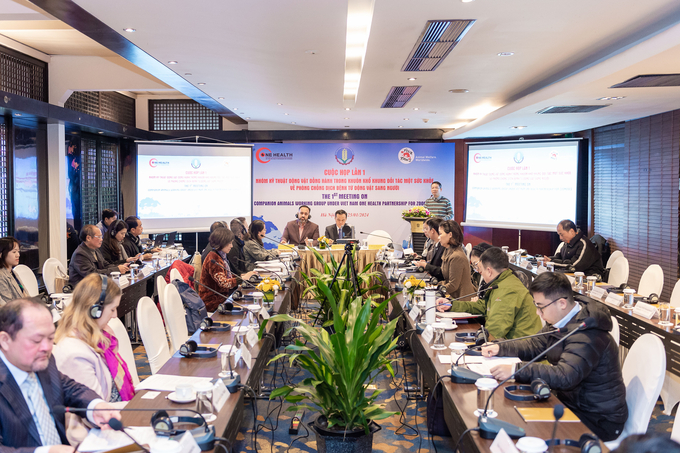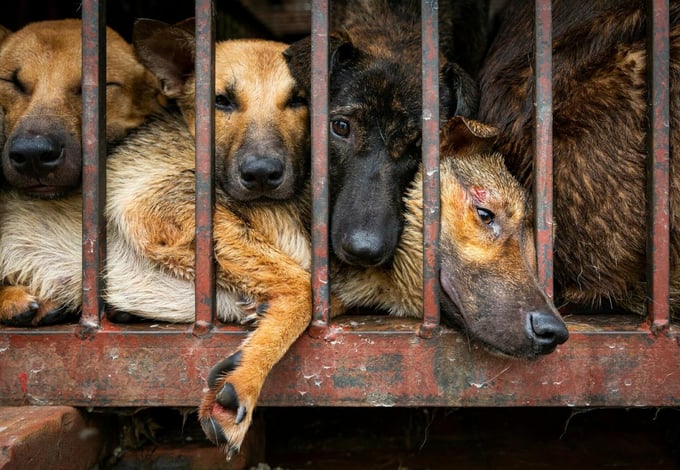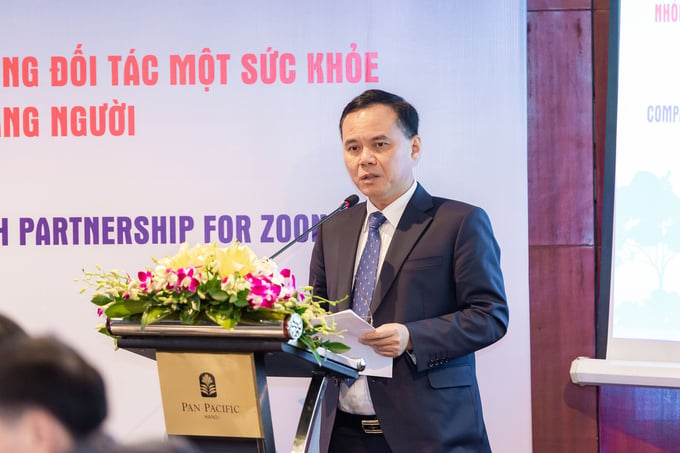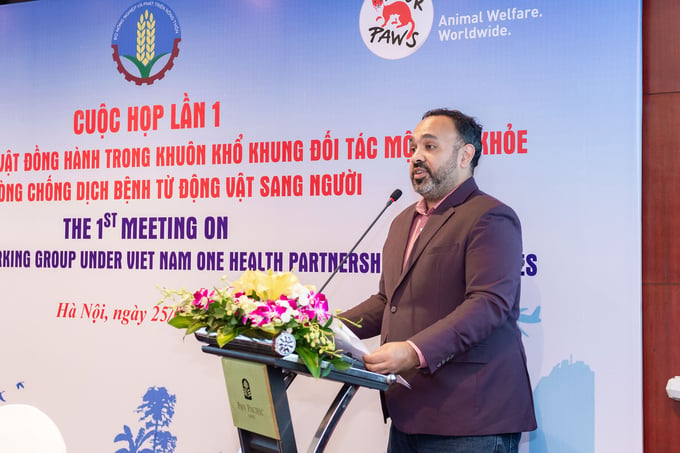May 22, 2025 | 18:45 GMT +7
May 22, 2025 | 18:45 GMT +7
Hotline: 0913.378.918
May 22, 2025 | 18:45 GMT +7
Hotline: 0913.378.918
One Health Partnership for Zoonotic Diseases in collaboration with Four Paws co-hosted and launched the Companion Animals Working Group.
The Companion Animals Working Group’s objectives including: It serves as a platform for companion animal health and welfare stakeholders, including members from academia, development partners, the private sector and non-government organizations to share and exchange on their work on companion animal welfare and related issues from Vietnam and other countries. The group would encourage joint efforts from different stakeholders in support of the Government of Vietnam, in discussing one health concern, in relation to companion animals. Serving as a forum for discussion of rabies and measures that can be taken to enhance Vietnam’s and its partners’ efforts to eradicate rabies, including issues related to the dog and cat meat trade, etc.
Companion animals (dogs and cats) can bring a lot of joy, but they are also a big responsibility. Pet owners need to keep them healthy by providing enough adequate medical care (annual vaccination, general health check, etc.) and ensuring their basic needs are met (proper appropriate nutrition and husbandry, proper resting place, and regular daily walks). Annual vaccination is very important as it helps to protect dogs and cats from disease and reduces the rabies risk to humans. Humane management of free-roaming companion animals also needs to be considered in rabies eradication strategy.
Report of Department of Animal Health (MARD) presented at the conference highlights some existing shortcomings in the management, prevention, and control of rabies in Vietnam. According to the report, the total population of dogs and cats exceeds 7.4 million, with only about 47% of them being vaccinated against rabies. Additionally, only 12 (19%) provinces and cities achieve a vaccination rate of over 70% for the total population.

One Health Partnership for Zoonotic Diseases in collaboration with Four Paws co-hosted and launched the Companion Animals Working Group.
Among the issues raised, stray dogs, especially those without identified owners, remain unvaccinated against rabies. The management of dog populations in some areas is lacking, and there is a shortage of specialized teams for catching stray dogs. The common occurrence of unleashed and unmuzzled dogs has led to severe injuries and fatalities, causing social concern. Enforcement of regulations regarding the management of pet dogs and the proper vaccination against rabies is limited in many areas. Inter-agency coordination, particularly between the veterinary and health sectors, is also lacking in some regions.
The representative from the veterinary department provides additional information, stating that in 2023, there were 347 cases of rabies in animals reported in 202 communes across 106 districts in 31 provinces and cities. Active monitoring in 7 provinces, involving 1,146 investigations, detected a 55% positive rate for rabies among 113 suspected dogs.
To implement the directives of the Prime Minister and the Ministry of Agriculture and Rural Development regarding the prevention and control of rabies, the representative proposes tightening the management of dog and cat populations, increasing rabies vaccination, enhancing testing and monitoring capabilities for rabies in animals, and establishing safe disease zones for rabies.
At the local level, the report recommends regular rabies vaccination for dogs and cats, effective management of pet populations, strengthened preventive treatment for human rabies, and strict measures against non-compliance.

On May 9, 2023, Four Paws International officially became a member of the One Health Partnership (OHP) in Vietnam, focusing on preventing the transmission of zoonose diseases. As part of this collaboration, the Technical Working Group within the Health and Animal Welfare Partnership Framework has been established. FOUR PAWS has been working closely with the Secretariat of the One Health Partnership (OHP) to develop reference terms for the Technical Working Group to improve the welfare and health of companion animals and address risks within the OHP framework.
Mr. Pham Kim Dang, Deputy Director of the Livestock Department, stated that this forum would serve as a platform for stakeholders in companion animal welfare and health, including various economic components. The forum aims to discuss rabies and potential measures to strengthen Vietnam's efforts and collaborations to eliminate rabies, covering issues related to the trade of dog and cat meat. It also aims to discuss current policies and laws related to companion animals (animal welfare) in Vietnam, promote common policy issues for action by the Vietnamese government and relevant parties, and discuss and promote activities to minimize physical and mental health risks from interactions with companion animals.

Mr. Pham Kim Dang, Deputy Director of the Livestock Department, stated that this forum would serve as a platform for stakeholders in companion animal welfare and health, including various economic components.
Mr. Vu Thanh Liem, Deputy Director of the International Cooperation Department and Head of the OHP Secretariat, emphasized the need to look at countries such as South Korea and Cambodia, which have strict regulations on the illegal capture and slaughter of dogs and cats. He highlighted the potential for Vietnam to learn and implement similar advancements in animal welfare in general and companion animals in particular.
In Vietnam, there are already several decisions in the Laws on Livestock Law and Veterinary related to these issues. However, compliance faces many challenges due to awareness, infrastructure investment, facility conditions for slaughter, and healthcare conditions. On the flip side, there are also many advantages related to integration conditions, voluntary adoption of international processes, and meeting international requirements for businesses, associations, and cooperatives in veterinary and livestock.

From FPI's coordinating agency perspective, Dr. Karan Kukreja, Head of the Companion Animals Campaign in the Southeast Asia region, praised the OHP framework for the 2021-2025 period.
From FPI's coordinating agency perspective, Dr. Karan Kukreja, Head of the Companion Animals Campaign in the Southeast Asia region, praised the OHP framework for the 2021-2025 period. The OHP plays a coordinating and supportive role for Vietnam in taking the lead in addressing One Health risks, both current diseases and the spread of emerging diseases in the future. He affirmed FPI's commitment to co-chair the upcoming meetings, contributing to the implementation of OHP's goals and tasks through high-level and technical cooperation mechanisms.
Translated by Dieu Linh

(VAN) The draft amendment to the Circular on rice export trading stipulates a periodic reporting regime for rice exporting enterprises.

(VAN) Dong Thap farmers attained an average profit margin of 64% during the summer-autumn 2024 crop (first season), while An Giang and Kien Giang farmers followed with 56% and 54%, respectively.

(VAN) As a doctoral student doing research on renewable energy and electrification at Harvard University, the author shares his musings on electricity, nature, and countryside memories.

(VAN) The decree on Extended Producer Responsibility (EPR) ensures transparent management and disbursement of support funds, avoiding the creation of a “give-and-take” mechanism.

(VAN) Hue City rigorously enforces regulations regarding marine fishing and resource exploitation, with a particular emphasis on the monitoring of fishing vessels to prevent illegal, unreported, and unregulated (IUU) fishing.

(VAN) Hanoi People's Committee has issued a plan on reducing greenhouse gas emissions in the waste management sector with 2030 vision.

(VAN) Vietnam's draft amendment to Decree No. 156 proposes a mechanism for medicinal herb farming under forest canopies, linking economic development to population retention and the sustainable protection and development of forests.